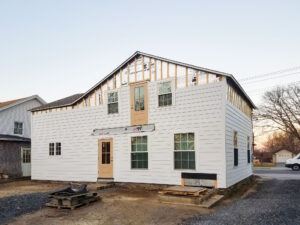 Do you ever get up in the morning and say, “I don’t want to live my life to the fullest, so I think I will neglect my health?” It is not a likely scenario, but one that happens on an unconscious level to many of us. Most people will describe themselves as fairly healthy, but when you probe further, you’ll find out about lots of aches and pains, a family history with strong ties to chronic illness, or a lack of a proactive approach to their health.
Do you ever get up in the morning and say, “I don’t want to live my life to the fullest, so I think I will neglect my health?” It is not a likely scenario, but one that happens on an unconscious level to many of us. Most people will describe themselves as fairly healthy, but when you probe further, you’ll find out about lots of aches and pains, a family history with strong ties to chronic illness, or a lack of a proactive approach to their health.
Most women are aware that at age 40 they should have a screening mammogram; however, most women and men are unaware of the need for colorectal cancer screening by age 50, or earlier if they have a familial history or symptoms. Symptoms can include bloody stool, diarrhea or sudden weight loss, though often, there are no symptoms at all. Colorectal cancer is the only cancer that is 90 percent preventable when caught early. It is also a cancer that can have no symptoms. A simple colonoscopy screening can detect cancer-causing polyps and allow for their removal before they turn into colorectal cancer.
As business professionals, we are always trying to improve our bottom line – work smarter not harder, find our competitive advantage, be strategic in our planning, and be intentional. These are all laudable goals, but none of your best plans or ideas matter if you neglect your health and lose your future. This includes not just your professional future pursuits but also your personal ones. We often dream of completing our “bucket list,” doing those things that bring us joy, a sense of achievement, or a special adventure with family or friends. Our quality of life matters. So why would adults with generally good judgement put off a simple medical test like a colonoscopy that could save their life?
A colonoscopy is a test that takes a little planning on your part, but it will be time well spent if you take the long view of your life. You will need to drink the prep solution the day prior to the procedure, and you may have to take a day off from work. You will be sedated during the procedure, but it is necessary – it could save your life.
If you are age 50 or above, you don’t need a medical referral and can just make an appointment to schedule the test. Find out where your insurance covers the procedure and get scheduled. There are also free colonoscopies available locally for the uninsured or under insured.
Here’s the good news, if you have no polyps, it is suggested you schedule a colonoscopy every 10 years. If polyps are detected and the polyps are removed, then screening is recommended every five years. A few days out of a lifetime is a small investment of personal time with a big return for your quality of life and for those you love.
If you are 50 or older and haven’t been screened, what are you waiting for?
If you are under age 50 and are having symptoms, or you just found out that you have a close family member who was diagnosed with colorectal cancer, it is recommended that you speak with your doctor about scheduling a colonoscopy.
American Cancer Society data shows colorectal cancer as the third most common cancer and the second leading cause of cancer deaths among both men and women in the United States. According to the National Institutes of Health, the annual cost to treat colorectal cancer in the U.S. is $14 billion dollars. For those diagnosed with colorectal cancer, the cost in the initial year of treatment is $51,327, and the cost for care during the final year of life is $85, 671. These cost estimates are only for the treatment of colorectal cancer and do not reflect the other costs and treatments often needed when complications arise. The financial costs to treat colorectal cancer pale in comparison to the cost of human suffering the disease causes due to numerous surgeries, chemotherapy and radiation, not to mention the complications and side effects of these treatments. The loss of loved ones to families and communities is beyond calculation.
On the other hand, an average colonoscopy costs only $2,400 and as mentioned earlier, 90 percent of colorectal cancer can be found and treated by polyp removal when found early. Colorectal cancer screening rates in Illinois need improvement. Illinois is ranked 44th out of 50 states for colorectal screening. These statistics need to be improved.
A new local non-profit, Colorectal Cancer Life, has a two-fold mission 1) to offer support to those that have been diagnosed with colorectal cancer and 2) to raise awareness of the need for screening as a life saving measure. Wendy Lewis, CRC Life founder and survivor, currently co-facilitates a survivor and caregiver group with survivor Cathleen Schisler. Wendy can be reached for information at 309-267-9196 or email at Info@CRC-LIFE.org and on the web at www.CRC-Life.org.
March is Colorectal Cancer Screening awareness month. I am going out on a limb and guessing you didn’t know that! As an individual age 50 or older, please take the initiative to get your screening colonoscopy this year. If you are an owner or decision maker for a business, we challenge you to take the greater initiative and spread the word at your company through increased screening awareness. Consider giving encouragement, and if possible, incentives to your employees age 50 and up to get screened. Yes, it can help your businesses bottom line if you have a healthier workforce and less catastrophic insurance costs, but don’t let that be the only reason. There is a greater reason – it is simply the right thing to do. Excellent endoscopy centers are available across the state. Ask your physician to recommend one.
Please help us raise awareness about Colorectal Cancer Screening at age 50. Let’s knock the number two cause of cancer related deaths down a few pegs…at least in our community.
Please…Get screened, stay healthy and LIVE to finish your bucket list.
Diane Hahn lost her husband Paul to CRC in November 2016. Paul was the founder of Mackinaw Valley Vineyard, which Diane still operates with her family. CRC Life founding members are Wendy Lewis, Cathleen Schisler, Diane Hahn and Susan Krumholz, Certified Gastroenterology R.N.





